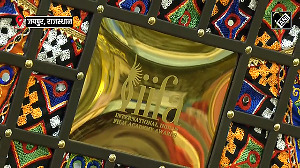Complete Coverage: The Volcker Report
Besides the Congress and Singh, about 130 Indian companies, including Cipla, Ajanta Pharma, Ranbaxy, Godrej & Boyce, Reliance Industries, Tata International, Indian Oil Corporation and RITES Ltd have been named in the report.
Rediff.com talked to three leading exporters from India, whose companies have been accused of 'paying kickbacks' to the Saddam Hussein.
Unlike Singh and the Congress, private companies seem relatively calm about the allegations, as most of their dealings with Iraq had been by cheque, and payments were, in most cases, made for ostensible expenses on the part of the Iraqi government.
According to reliable sources, Singh and his party knew beforehand about the allegations that will come up in the Volcker report but they preferred to keep mum.
None of the Indian businessmen contacted by rediff.com had cared to reply to the notices sent by the Volcker committee.
"It's unlikely that any investigation agency can prove the corruption of Indian companies during the Saddam Hussein regime. The non-contractual beneficiaries and the actual implementer of the deals or the trading companies had no direct connections most times. If the UN is serious about taking action, they must charge the trading companies," a leading businessman based in Mumbai told rediff.com.
"If x politician has got a favour, he will create a front company to realise the deal. So it is difficult for any Indian committee to dig out such fake companies from the list of 2,000 companies [mentioned in the Volcker report] and then prove the link between two."
The businessman clarified that the only way to get anywhere close to the truth would be to compare the amount deposited in the bank by the 'unknown company' and the value of a deal granted by the Saddam Hussein regime and see if they matched.
What worries those named in the report at the moment is the fact that Saddam only gave written permission, so a record must exist somewhere of the deal, they fear.
A Rajasthani businessman who has lived in Baghdad from 1998 to 2003 and extensively dealt with Iraq's Oil-for-Food programme, explained the do's and don'ts of doing business in Iraq under Saddam.
"In Baghdad, when Saddam Hussein was ruling, he was God and nothing less. Not a barrel moved out of Iraq without his consent. Natwar Singh's case makes interesting reading because in Iraq all the deals, payments to the government, legal and illegal, were recorded somewhere. Nothing happened in Iraq without Saddam knowing about it. Around the year 2000, no one thought about the situation which exists today. Do you think any genius ever thought that one day the US will access all the documents pertaining to oil dealings and preside over it?"
When asked about how the Congress party's name had cropped up in the report, the businessman said, "I don't want to speculate that Natwar Singh or the Congress party indulged in financial corruption by giving political support to Saddam but my experience tells me there are certain possibilities if at all that evidence exists somewhere against them."
When the Congress delegation led by Natwar Singh went to Iraq in 2001 carrying Congress President Sonia Gandhi's letter expressing solidarity with the Iraqi people, he handed over the letter either to President Saddam Hussein or his deputy prime minister, Tariq Aziz. It is highly possible Saddam might have scribbled a few words in Arabic on the same letter granting favours to Singh or more than one Congress leader or somebody who wanted to misuse the Congress's name to get a contract.
Another possibility is that Aziz might have put in a word to President Hussein that a Congress party leader (Natwar or someone else) visited him for oil deals and Sonia Gandhi's letter might have been forwarded by Aziz's office to Hussein's office for approval, which is now on record and cited by Volcker.
People who knew the Iraqi regime believe the letter carried weight because Saddam had high regard for the Congress, particularly former prime minister Indira Gandhi. It is not at all surprising, then, that he granted (if at all the charges are proved) substantial oil business to people who were perceived as leading Congressmen.
An Indian businessman who is indicted in the report, claims it is just not possible for anyone to get Iraqi oil cheap without written permission from Saddam's office.
People who have dealt with the regime also claim that many businessmen did not take precautions, considering that the UN's own pricing committee was approving each and every deal granted by Saddam.
Most of the payments made to the Iraqi government's account with the Jordan National bank were much lower than the prevalent market price, but no one bothered to cover up the trail left behind.
Indian investigators Virendra Dayal and Justice R S Pathak have their task cut out: find out who were the people trying to misuse the Congress party's name to gain access to Saddam's durbar.






 © 2025
© 2025